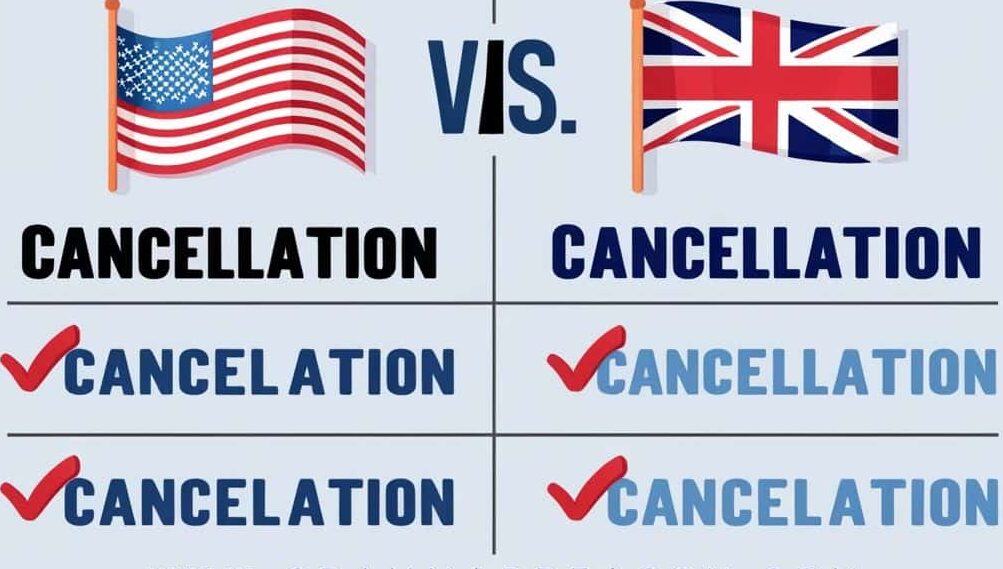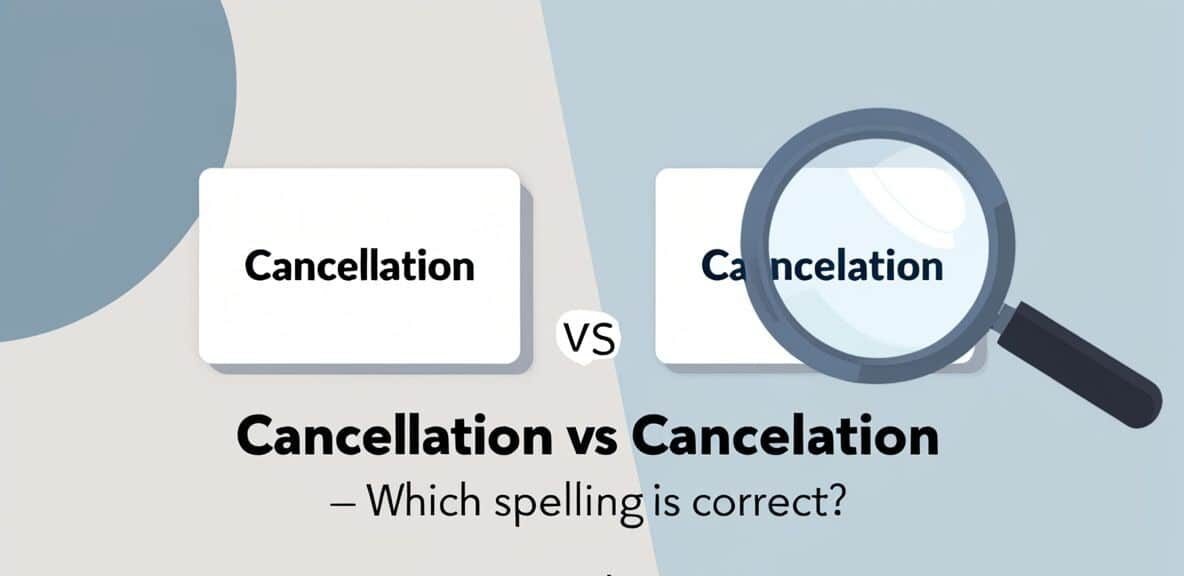When it comes to spelling, English can be tricky, especially with words like Cancellation vs Cancelation. Many writers, editors, and even native speakers find themselves wondering which spelling is correct. This confusion arises partly because of the subtle differences in American spelling of cancellation versus British conventions. Understanding these variations is essential if you want to write clearly and professionally.
In this article, we’ll explore the difference between cancellation and cancelation, discuss their meanings, and highlight the correct spelling in American English. Whether you’re drafting emails, reports, or academic papers, knowing which form to use will help you avoid common spelling mistakes and improve your overall writing style.
Why Does the Confusion Between Cancellation and Cancelation Exist?
The confusion between cancellation spelling variations mainly comes down to differences in American vs British spelling and historical language evolution. Both words carry the same meaning but differ in spelling by one letter double “l” versus single “l”. This subtle difference can throw off even seasoned writers.
English has always been a language full of quirks, and spelling inconsistencies often reflect regional preferences rather than mistakes. When it comes to “cancellation or cancelation,” knowing why the variations exist helps clarify which one you should use.
What Do Cancellation and Cancelation Mean?
At their core, cancellation and cancelation share the same definition: the act of calling off or stopping something that was planned or scheduled. You might hear about a cancellation of a flight, a meeting, or a subscription.
Though the meanings overlap, their spellings and acceptance vary. The cancelation spelling with a single “l” is far less common but still recognized in some circles. Whether you see “cancellation” or “cancelation,” the meaning remains consistent, which is why context matters more than the spelling itself.
Which Spelling is Correct in American English?

In American English, the correct spelling of cancellation almost always features the double “l.” While some dictionaries acknowledge “cancelation” as a variant, it remains uncommon and often flagged as incorrect by spellcheckers.
You’ll see “canceled vs cancelled” debated too, with the U.S. favoring the single “l” in the past tense (canceled) and the UK preferring “cancelled.” But for the noun, “cancellation” consistently uses two “l”s in the U.S.
| Spelling Type | American English | British English |
| Noun (act of canceling) | cancellation (double l) | cancellation (double l) |
| Past tense verb | canceled (single l) | cancelled (double l) |
Tip: To avoid confusion, always use “cancellation” with double L in American writing.
Read More: ‘Goodmorning’ or ‘Good Morning’: Which is Correct?
Why Do American and British English Differ on the Double L?
The answer takes us back to Noah Webster’s spelling changes in the 19th century. Webster aimed to simplify and Americanize English spelling to make it easier and more logical. That’s why American English favors “canceled” over “cancelled.”
However, the noun “cancellation” didn’t follow this simplification fully. The British kept the double “l” consistent in nouns and verbs. Meanwhile, Americans retained double “l” in the noun but simplified the verb form.
In short, the double L spelling in “cancellation” stuck on both sides, but American English made some exceptions in related forms. This history explains the sometimes confusing spelling rules American English follows today.
Is Cancelation Actually Wrong?
You might wonder, “Is cancelation correct?” The answer is nuanced. While “cancelation” appears in some dictionaries as a less common variant, it’s generally not preferred. Most formal writing, professional documents, and style guides advise using “cancellation” with two “l”s.
Here’s a quick example scenario:
- Incorrect: The airline announced a cancelation of all flights.
- Correct: The airline announced a cancellation of all flights.
In casual or informal contexts, some people might still use “cancelation,” but it’s best to avoid it to maintain professionalism and clarity.
Synonyms of Cancellation You Should Know
If you want to vary your language or aren’t sure about spelling, here are some synonyms of cancellation that can help:
- Termination (ending something before it finishes)
- Revocation (official withdrawal of a decision or offer)
- Annulment (legal voiding, often used for contracts or marriages)
- Suspension (temporary stoppage)
- Nullification (making something invalid)
Using these synonyms thoughtfully can add variety and precision to your writing, especially if you want to avoid repeating “cancellation” too often.
Examples of Cancellation and Cancelation in Context
Seeing words in action clears up a lot of confusion. Here are examples to show proper usage:
Scenario 1: Airline Ticket
- Due to the storm, there was a cancellation of all flights.
- (Rarely) The report mentioned a cancelation in the schedule, but most airlines use “cancellation.”
Scenario 2: Event Planning
- The conference faced multiple cancellations because of low attendance.
- Using “cancelation” in an official event memo would look odd and unprofessional.
Scenario 3: Subscription Service
- You can request a cancellation of your subscription at any time.
- “Cancelation” might appear in informal emails but should be corrected.
Tips to Overcome Confusion With Cancellation Spelling
Here are some practical tips to help you remember the correct spelling and avoid common mistakes:
- Remember the double L in “cancellation” as standard for the noun in both American and British English.
- Think of related words: since the verb is “cancel,” the noun doubles the “l” to keep the sound consistent.
- Use spellcheck tools but verify unusual suggestions like “cancelation” before accepting them.
- If you’re writing for a specific audience (US vs UK), tailor your spelling but stick to the accepted forms.
- When in doubt, use synonyms like “termination” or “revocation” to sidestep tricky spelling.
Origin of Cancellation and Its Spelling
The word “cancellation” traces back to Latin “cancellare,” meaning “to cross out or make void.” Over centuries, as English evolved, the word adapted through Middle English and Early Modern English.
The doubling of consonants before suffixes like “-ation” often happens when the root word ends with a vowel plus a single consonant. In this case, “cancel” ends with “-el,” so “cancellation” doubles the “l” following this rule.
Understanding these spelling rules British English and American English sometimes share and sometimes don’t helps make sense of why “cancellation” exists as it does.
Canceled vs Cancelled: A Quick Look
While we focus on cancellation vs cancelation, it’s helpful to peek at the verb forms since they’re related:
| Form | American English | British English |
| Past tense | canceled | cancelled |
| Present participle | canceling | cancelling |
Americans typically simplify spellings, dropping the second “l” in verbs, but keep it in nouns like “cancellation.” British English tends to keep the double “l” across both forms.
Professional Writing and Style Guide Recommendations
Most style guides recommend sticking with “cancellation” with double “l” for formal writing in the U.S. and the U.K.
- APA and Chicago Manual of Style endorse the double “l” form.
- Associated Press (AP) Stylebook also prefers “cancellation.”
- For business communication and academic writing, “cancelation” might raise red flags.
Following these standards ensures your writing appears polished and credible.
FAQs
Cancellation with double “l” is the preferred and widely accepted spelling in both American and British English.
Yes, but it’s an uncommon variant and generally not recommended in formal writing.
Because of English spelling rules, the consonant doubles before adding the “-ation” suffix to maintain the correct pronunciation.
Conclusion
In the debate of Cancellation vs Cancelation, the clear winner is cancellation with two L’s. This spelling is correct in both American and British English. While “cancelation” appears sometimes, it’s rare and not widely accepted. Using cancellation helps you sound professional and avoid mistakes. Remember, sticking to the right spelling makes your writing clearer and more trusted. So next time you’re unsure, choose cancellation it’s the safe and correct option every time.
References and Further Reading
- Merriam-Webster Dictionary – Cancellation
- Oxford English Dictionary – Cancellation
- Cambridge Dictionary – Cancellation
- Noah Webster’s Spelling Reforms History
- Google Ngram Viewer – Cancellation vs Cancelation

Anna Angelina is an experienced blogger with a passion for creating engaging and creative content. Specializing in Team Names and group identity ideas, she brings fresh insights and clever suggestions to inspire readers. With a knack for wordplay and a love for collaboration, Anna helps teams, clubs, and organizations find the perfect names that resonate with their goals and values.

